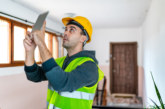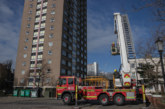The Building Safety Bill was introduced to Parliament in June 2021 and represents one of the biggest transformations in building regulations of our time.
Its three-stage gateway process, which is designed to create a ‘golden thread’ of information and is one of the most significant measures coming into effect as part of the Bill. With Gateway One already in place – and Gateways Two and Three to follow by 2023 – the process is set to provide a stringent framework for high-rise residential buildings, which will strengthen regulatory requirement through each stage of the build programme – from planning through to construction and occupation.
The Building Safety Bill has been welcomed by leading building control and regulation expert Bureau Veritas, which has labelled it as a ‘crucial requirement’ for the building industry. However, according to Andy Lowe, Technical & Training Director for Building Control at Bureau Veritas, there are a whole wealth of additional requirements associated with the Building Safety Bill – and indeed other regulations and safety acts – that will have a profound impact on developers, landlords and duty holders that goes far beyond Gateway Three.
Andy said: “As the Building Safety Bill passes through Parliament and comes to fruition, the Government is strengthening legislation across the board to ensure that landlords take responsibility of – and, crucially, are accountable for – building safety. This will include ensuring that existing high-rise residential buildings are fit for purpose, with the appropriate and up to date risk assessments, fire safety processes and lift maintenance plans in place, to name a few.”
For duty holders of the circa 11,000 existing high-rise residential buildings in the UK, the process will be a huge undertaking and the need to understand the proposed requirements is fundamental to meeting future regulatory obligations and providing reassurance to existing residents that life-saving equipment and common areas are safe and operational. Along with Building Safety Bill requirements, duty holders will also need to comply with proposed Fire Safety Act mandates and Lifting Operations and Lifting Equipment Regulations (LOLER), which includes notifying local fire and rescue services of building composition (including that of external walls) and regular, monthly inspections of any lifts that may be used in an emergency situation.
Andy said: “The task ahead is no mean feat, and the wider industry – such as fire risk assessors and lift inspectors – must ensure absolute trust and competency in its workforce to deliver such an undertaking. This is an industry-wide challenge that must be addressed, and one which was cited heavily in Dame Judith Hackitt’s final report.
“As the Building Safety Bill comes into play and other existing regulations and acts develop, there is going to be a clear cross over between the requirements of each. Unfortunately, these are yet to be determined – but they are something duty holders will have a responsibility to meet.
“This is where working with a competent third party, such as Bureau Veritas, can help – particularly when it comes to preparing for regulatory change. My advice to duty holders and landlords is not to wait for changes to come into force, but prepare and plan for them now by introducing relevant processes and protocols to meet new requirements head on and ensure a smooth process to regulatory compliance.”
Bureau Veritas works with developers, duty holders and landlords as an independent third party throughout the building lifecycle and beyond to help reduce risk and to achieve compliance.









